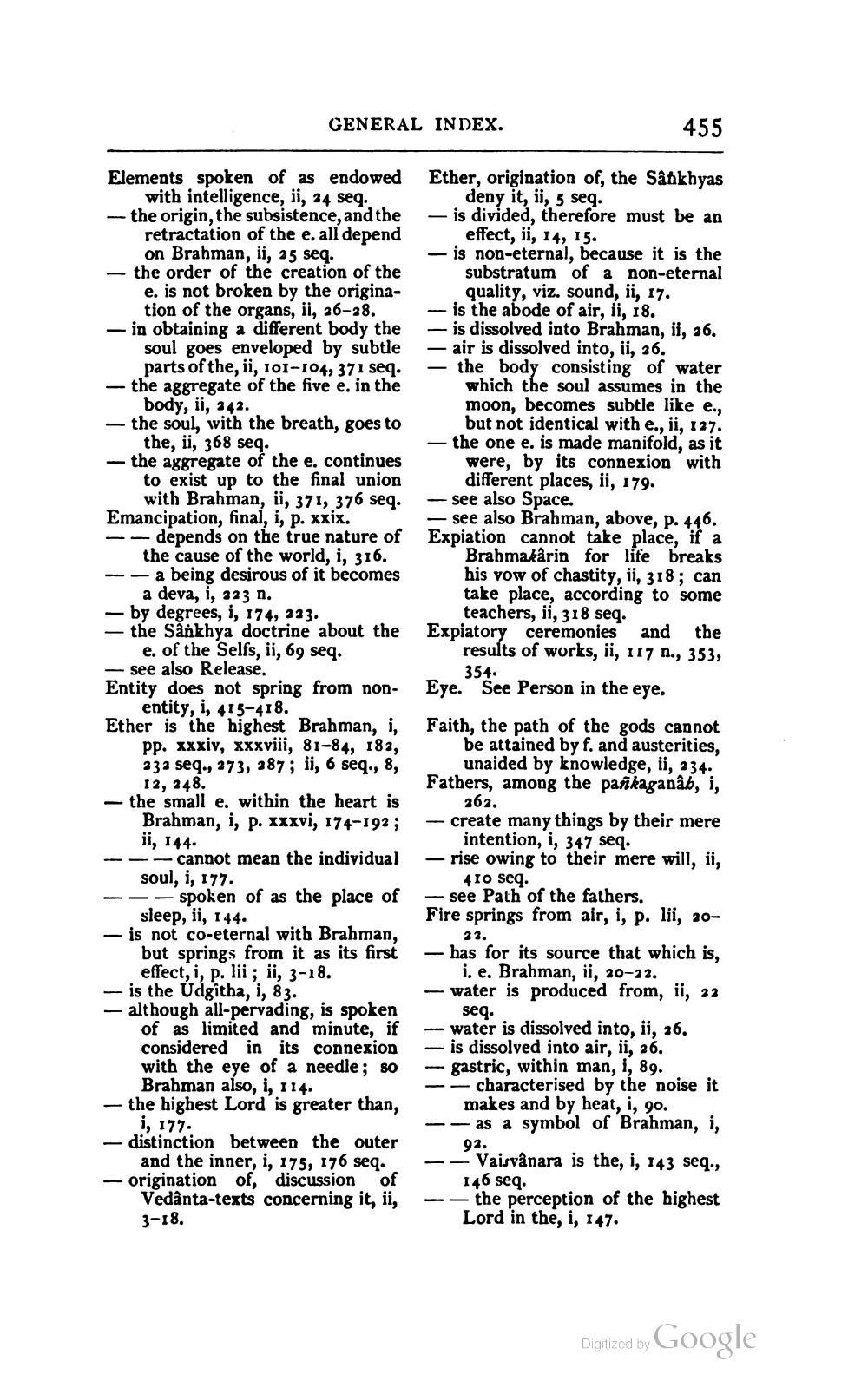________________
GENERAL INDEX.
455
so
Elements spoken of as endowed
with intelligence, ii, 24 seg. --the origin, the subsistence, and the
retractation of the e. all depend
on Brahman, ii, 25 seq. - the order of the creation of the
e. is not broken by the origina
tion of the organs, ii, 26-28. - in obtaining a different body the
soul goes enveloped by subtle
parts of the, ii, 101-104, 371 seq. - the aggregate of the five e. in the
body, ii, 242. - the soul, with the breath, goes to
the, ii, 368 seq. - the aggregate of the e, continues
to exist up to the final union
with Brahman, ii, 371, 376 seq. Emancipation, final, i, p. xxix.
- depends on the true nature of
the cause of the world, i, 316. -- a being desirous of it becomes
a deva, i, 323 n. - by degrees, i, 174, 123. - the Sănkhya doctrine about the
e. of the Selfs, ii, 69 seq. - see also Release. Entity does not spring from non-
entity, i, 415-418. Ether is the highest Brahman, i,
pp. xxxiv, xxxviii, 81-84, 182, 23a seq., 273, 387; ii, 6 seq., 8,
12, 248. - the small e. within the heart is
Brahman, i, p. xxxvi, 174-192;
ii, 144. --- cannot mean the individual
soul, i, 177. - -- spoken of as the place of
sleep, ii, 144. - is not co-eternal with Brahman.
but springs from it as its first
effect, i, p. lii ; ii, 3-18. - is the Udgitha, i, 83. - although all-pervading, is spoken
of as limited and minute, if considered in its connexion with the eye of a needle; so
Brahman also, i, 114. - the highest Lord is greater than,
i, 177. - distinction between the outer
and the inner, i, 175, 176 seq. - origination of, discussion of
Vedanta-texts concerning it, ii, 3-18.
Ether, origination of, the Sankhyas
deny it, ii, 5 seg. — is divided, therefore must be an
effect, ii, 14, 15. - is non-eternal, because it is the
substratum of a non-eternal
quality, viz. sound, ii, 17. - is the abode of air, ii, 18. - is dissolved into Brahman, ii, 26. - air is dissolved into, ii, 26. - the body consisting of water
which the soul assumes in the moon, becomes subtle like e.,
but not identical with e., ii, 127. - the one e. is made manifold, as it
were, by its connexion with
different places, ii, 179. - see also Space. - see also Brahman, above, p. 446. Expiation cannot take place, if a
Brahmakarin for lite breaks his vow of chastity, ii, 318; can take place, according to some
teachers, ii, 318 seq. Expiatory ceremonies and the
results of works, ii, 117 n., 353,
354. Eye. See Person in the eye.
Ether, D. XXXIV; 73, 287
in
Faith, the path of the gods cannot
be attained by f. and austerities,
unaided by knowledge, ii, 234. Fathers, among the paskaganâb, i,
262. - create many things by their mere
intention, i, 347 seq. — rise owing to their mere will, ii,
410 seq. — see Path of the fathers. Fire springs from air, i, p. lii, 30
22. - has for its source that which is,
i. e. Brahman, ii, 20-22. - water is produced from, ii, 22
seg. - water is dissolved into, ii, 26. - is dissolved into air, ii, 26. - gastric, within man, i, 89. -- characterised by the noise it
makes and by heat, i, go. --- as a symbol of Brahman, i,
92. - - Vaisvânara is the, i, 143 seq.,
146 seq. -- the perception of the highest
Lord in the, i, 147.
sen
Digitized by Google




